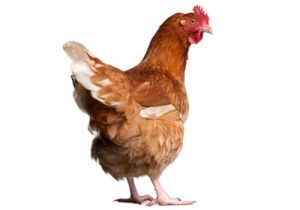
Lots of people in the Macedon Ranges have a few backyard chickens to give them fresh eggs and enjoy watching them scratching around the garden. Backyard chickens live a very different life to factory chickens and face different health issues.
Backyard chickens have frequent access to sunlight, dust bathing, open space and fresh grass when given free range opportunity but they are also exposed to a variety of diseases brought by wild birds or by eating the grubs and bugs in the garden.
Their care and management is therefore slightly different to factory hens and good stockmanship for any farm animal is essential to their welfare.
Chickens need continuous access to balanced nutritional food and plenty of fresh clean water as chickens consume large amounts of water daily, especially in the warmer weather. Chickens like to roost up high in dry clean and drought proof environment and to lay eggs in laying boxes with clean sawdust or straw. Their enclosure must be fox proof and this can be achieved in many different ways.
Factory chickens are hatched and then vaccinated for a variety of disease to prevent ill health. Often our backyard chickens have not had the benefit from these vaccines, especially if they have been hatched by a hobby breeder or at home. Important viruses that cause ill health in backyard chickens are Marek’s Disease Virus, often causing a leg paralysis in young chickens, and Infectious Laryngotracheitis Virus which contributes to “colds and flues”.
Mycoplasma is another organism which causes sinusitis or a swollen eye with the snuffles and can work together with other viruses to cause respiratory illness. Backyard and free ranging chickens are exposed to a variety of gut worms, some directly from exposure of other chickens manure but some through them eating bugs and grubs in the grass. Backyard chickens need regular worming to get rid of these worms. The Gisborne Veterinary Clinic stocks several different worming products for home chickens and can give advice about their use.
Backyard chickens are also exposed to some skin parasites such as lice and mites, some of which suck blood which makes the bird anaemic and unwell. The Gisborne Veterinary Clinic stocks medicine to keep these pests at bay and can advise you on their use and preventative measures to minimize the distress these parasites cause. As egg laying creatures some chickens do suffer from reproductive problems with eggs becoming stuck in the reproductive tract or causing infection in the abdomen. With the high egg laying breeds such as the HighSex, Isa Brown and Hi-Line it is very important that their nutritional needs are met in the form of Layer Pellets (not mixed seeds as they eat these selectively) so that their diet matches the requirements on their body to lay so many eggs. These breeds do tend to live a shortened lifespan due to the demands on their body from laying so many eggs per year.
There are many other breeds of chickens which may be enjoyed not only for their eggs but for their unique appearances and the Kyneton and District Poultry Club holds regular meetings and auctions where these other breeds may be viewed or purchased.
Chickens do well in a group of about 10-12 birds and they do not strictly need a rooster in their group to stop behavioural difficulties betweens hens if you do not exceed these numbers.
Chickens moult by changing their feathers generally in the autumn and during this time fewer eggs are laid.
Chickens are a great addition to the livestock kept on a small farm or large garden and provide not only eggs but the enjoyment in watching them in the garden. They do have health needs however attention to their environment, regular deworming and external parasite control these are all essential to their welfare and good health.



Hi,
I live in Woodend and an extremely concerned about my Rooster. I believe he has lost one of his eyes – which is now extremely swollen (size of a golf ball) with puss where the eyeball would have been.
I have just read your article and believe it might be:
Mycoplasma is another organism which causes sinusitis or a swollen eye.
What would be the cost of having this looked at and fixed up.
Thanks,
Vanessa Parry
0438 333 315
Hi Vanessa,
Thank you for your enquiry.
Please contact our reception staff on (03) 54282805 to discuss costs for a consult and check-up.
Hi~~
Do you know where can we buy hens or pullets in Gisborne?
Thank you very much.
Sam Chen
0272662531
Hi Sam,
Although we are not closely sourced with any particular chicken breeder in the local area, you can try logging on to this website https://macedonrangeshenhouse.webs.com/ to see if they may have something suitable for you.